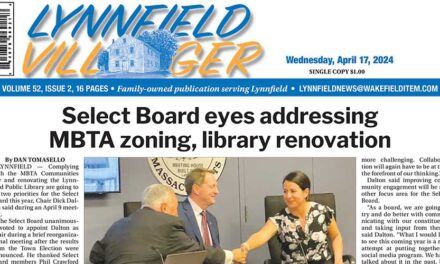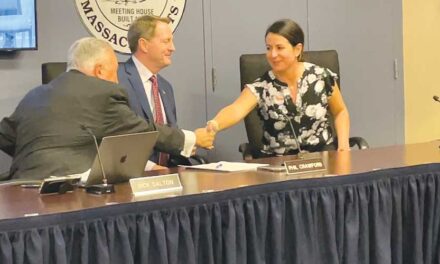Published in the January 25, 2017 edition
By MAUREEN DOHERTY
LYNNFIELD — Attorney Tom Mullen drew a round of laughter at Monday’s selectmen’s meeting when he characterized the passage of ballot Question 4 legalizing the recreational use, cultivation and sale of marijuana statewide as “a nightmare for Town Counsels throughout the commonwealth.”
But all kidding aside, Mullen explained that this referendum vote poses “such a challenge” because its flawed language does not correlate to the manner in which municipalities pass bylaws and conduct the oversight of business ventures within their borders or the way in which the courts settle disputes about these matters between a town and an entrepreneur.
While the initiative petition statute passed by a majority of Massachusetts voters last November “allows the retail sale and production of marijuana products” in the state, Mullen told the board that it also “contains some limited opportunities for municipalities to prevent such sale and production within their borders.”
However, the devil is in the details, and the wording of the statute that is intended to grant this right of control to municipalities by allowing the adoption of limited restrictions appears to be incorrect, Mullen said. Adding to the conundrum is the fact that the courts, the state Legislature and the state Attorney General have yet to settle the matter.
“It says that if you wish to do so you have to pass a bylaw which is ‘adopted by the voters at the polls.’ Now, stop and think about that. We all know…that you adopt a bylaw in a town at Town Meeting. It says so in our Charter; it says so in state law,” Mullen explained.
He asked, “What does it mean ‘to adopt’ … a bylaw at the polls?” emphasizing that he was specifically quoting the term “adopt” from the statute itself.
Mullen has posed this question to others who serve as town counsel in various communities, but has yet to hear a satisfactory answer. He said some “think that it means you don’t actually ‘adopt,’ rather you ‘approve,’ you ‘ratify,’ you ‘authorize.’ But it doesn’t say that. It says ‘adopt.’”
On the surface this appears to be splitting hairs. But, if the town forges ahead and adopts a flawed bylaw it could be rejected by the Attorney General, possibly eliminating a window of opportunity to exercise its option to impose any local restrictions. Or an aggrieved entrepreneur could sue and expose the town to the expense of litigation in court, where Mullen would be asked to defend the town’s position, splitting hairs once again over the specifics of the terminology.
Lynnfield voters rejected pot referendum
While a majority of voters statewide approved the recreational use of marijuana, voters in Lynnfield were equally clear in their opposition to this change, rejecting it by a margin of 4,427 to 2,940. This gave the selectmen a basis for requesting that Mullen draft potential bylaw amendments to protect the town’s interests.
Mullen predicted court challenges would arise if the action the town took was too simplistic, such as taking a simple vote at the polls to “adopt” a bylaw banning recreational retail pot shops in town or approving a referendum question authorizing Town Meeting to “pass” a bylaw banning pot shops if the literal terms of such a bylaw were not specifically “adopted.”
“My approach in the face of any ambiguity is to have a belt and suspenders approach,” Mullen said, recommending that the town literally take two distinct actions in the hope that at least one gets the job done.
“We should have a referendum vote at the annual election that says: ‘The town of Lynnfield adopts the following bylaw,’ and then quote it directly,” Mullen advised, adding that this referendum vote “also says that Town Meeting is authorized itself to also pass such a bylaw. So we have both an adoption by the voters – whatever that means – and an approval up front of action at Town Meeting.”
General vs. Zoning Bylaws
But Mullen wasn’t done yet because there exists yet another “ambiguity,” he said, explaining that a bylaw “applicable to the whole town…should be a General Bylaw” because Zoning Bylaws exists “to treat different zones of the town differently.”
Mullen acknowledged that a “very troubling line of case law” exists in Massachusetts, however. When a town legislates on a particular matter using Zoning Bylaws to exempt or impose specific regulations, and subsequently passes a General Bylaw to regulate the same matter “the courts may strike down that General Bylaw under the theory that you are trying an end-run around the requirement of passing a Zoning Bylaw,” he said.
It’s a matter of mathematics. “It’s harder to pass a Zoning Bylaw because it takes a two-thirds vote, not a majority vote; you need a public hearing before the Planning Board, you have notice requirements, and there are benefits to residents with respect to a Zoning Bylaw because of the grandfathering clause. There is no grandfathering against a General Bylaw,” Mullen said.
Lynnfield is like most other towns in the state in that it previously adopted a Medical Marijuana Zoning Bylaw, therefore, Mullen said, the town “may be held by a court, if it came to litigation, to have to legislate the zoning (bylaw) route, rather than the general (bylaw) route.”
As if the waters weren’t muddied enough, Mullen added another scenario. “What if the voters at the polls authorized these bylaws and then we go to Town Meeting and we get a majority vote but not a two-thirds vote? Then we’re out of luck,” he said.
To avoid that prospect, Mullen proposed to the selectmen that the townspeople be presented with two bylaws, a General Bylaw and a Zoning Bylaw.
“It’s awkward as hell”
“Have the voters authorize them both through the referendum. Have Town Meeting pass the General Bylaw by majority vote and pass the Zoning Bylaw by the two-thirds vote. It’s awkward as hell. It’s ugly. Maybe sometime down the road after all this has been sorted out by the Attorney General and the courts — neither of whom have spoken yet on what this statute means — we can rescind one of these bylaws so that only one remains in place,” he said.
Taking this approach would achieve what Mullen said was his only goal: “To make sure we legislate in such a way that it can be upheld if there is a litigation challenge.”
Selectmen on board
The selectmen unanimously approved Mullen’s two-prong approach. This means that at the annual town election on April 10, voters will be asked to approve two referendum questions to “adopt” a Zoning Bylaw change and a General Bylaw change that would effectively ban retail marijuana establishments in town, except those approved as “medical marijuana facilities.”
“There’s no way you can avoid having a medical marijuana facility under certain circumstances,” Mullen explained.
If these referendum questions are passed at the polls, the second step in this process is to have the voters at the annual Town Meeting on April 24 approve both the General Bylaw and the Zoning Bylaw, Mullen said.
Another option that many communities are taking is a request for a moratorium “on any marijuana establishments until the end of June of 2018, and that’s been upheld by the Attorney General,” Mullen said. However, he cautioned the risk the town would be taking is that the AG does not get the final say in these matters if the moratorium was challenged in court.
“But if you want to take action right now and you think that the referendum might pass now, then I would recommend this belt and suspenders approach.”
Therefore, what is before you is a proposed referendum question that says, ‘shall the town of Lynnfield adopt and shall the Lynnfield Town Meeting be authorized to adopt the following bylaw amendments.’ And there follows a proposed Zoning Bylaw change and a proposed General Bylaw change, the effect of both of which would be ‘no marijuana establishments in town except to the extent where we are talking about medical marijuana.”
Selectmen Chairman Phil Crawford thanked Mullen for his insights.
“The town of Lynnfield was strongly against it and I think this supports how they voted,” Crawford said.
“To take it a step further and handle both Zoning and the General Bylaw change at this time, I believe that is a great way to attack it at April Town Meeting as well as bringing it up on the ballot question in the election,” Crawford added.
Selectman Chris Barrett concurred. “I think this is a good way to go. Fortunately for us, Lynnfield voted strongly against this. I think the law itself is a mess and it is a major challenge for cities and towns throughout the commonwealth, whether it be for public education or for young people in communities,” Barrett said. “All of the voters have spoken. I think it is necessary to bring it to the ballot this April.”
Selectman Dick Dalton asked if there was a chance the town could change its strategy between now and Town Meeting if the Legislature made any changes relating to this matter.
Mullen said, “Any legislative change could change our strategy completely. What if all of the deadlines were put off by some years? Then we’d have a lot more time to think about this.”
Town Administrator Jim Boudreau said, “One change that we would ask the legislature to consider that would have a positive impact would be to change it from an ‘opt-out’ to an ‘opt-in’ so that communities have to vote to allow (retail pot shops) as opposed to vote to disallow it.”
He said he has spoken to both Rep. Brad Jones and Sen. Thomas McGee “and they seemed supportive but they couldn’t tell us whether the legislature will pick that up. The legislature’s very reluctant to make changes to voter-approved initiatives,” Boudreau said.




